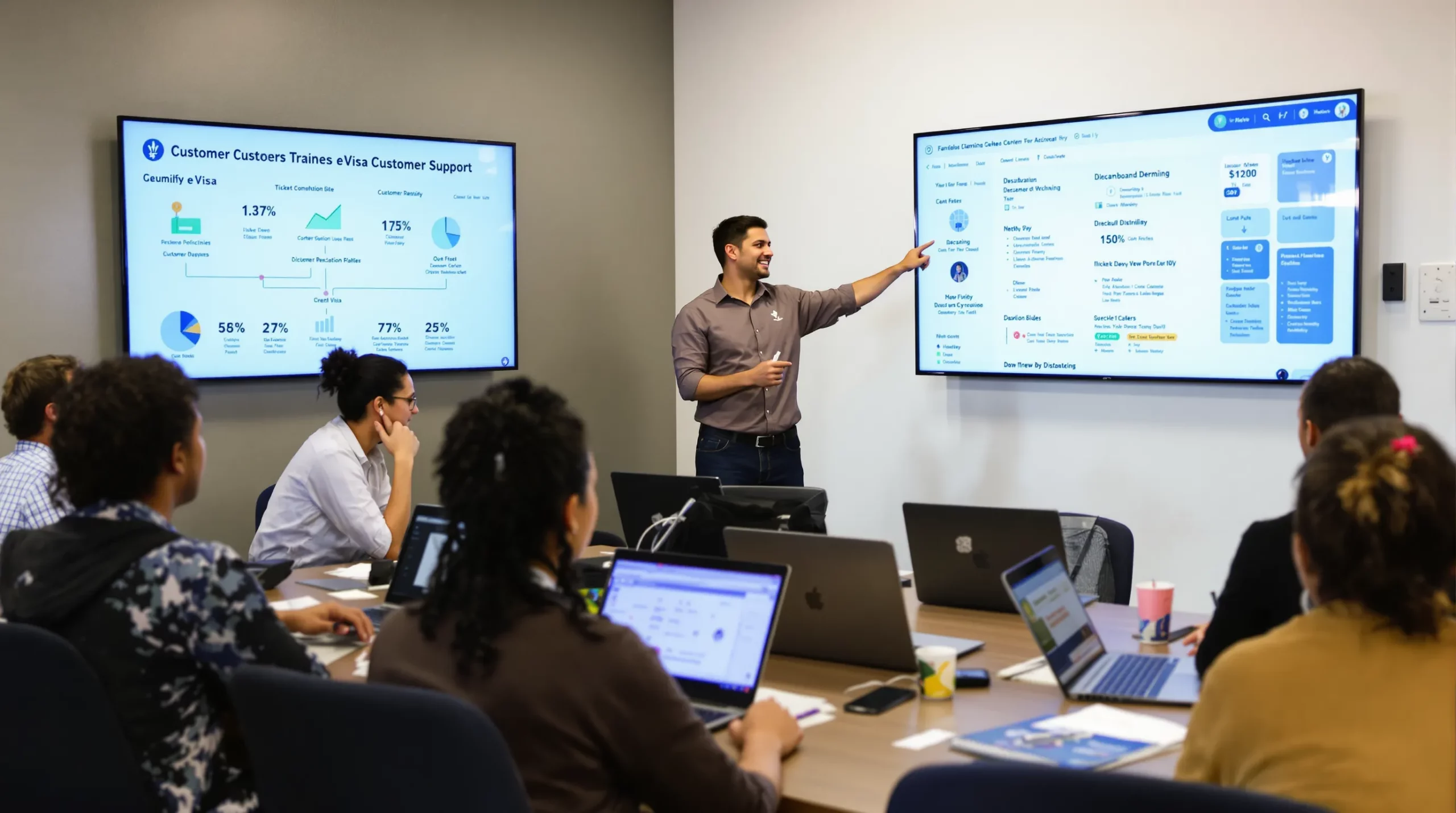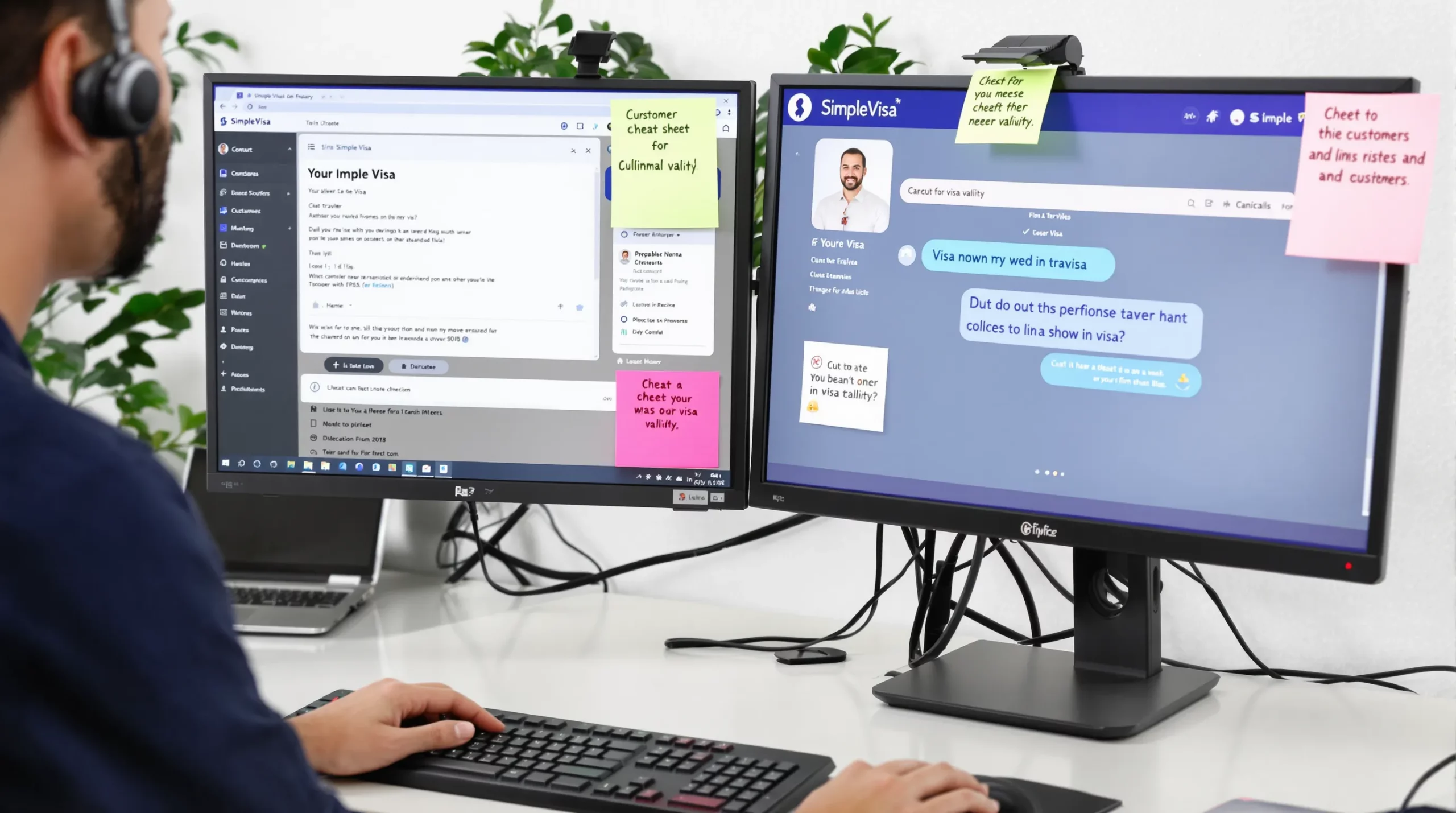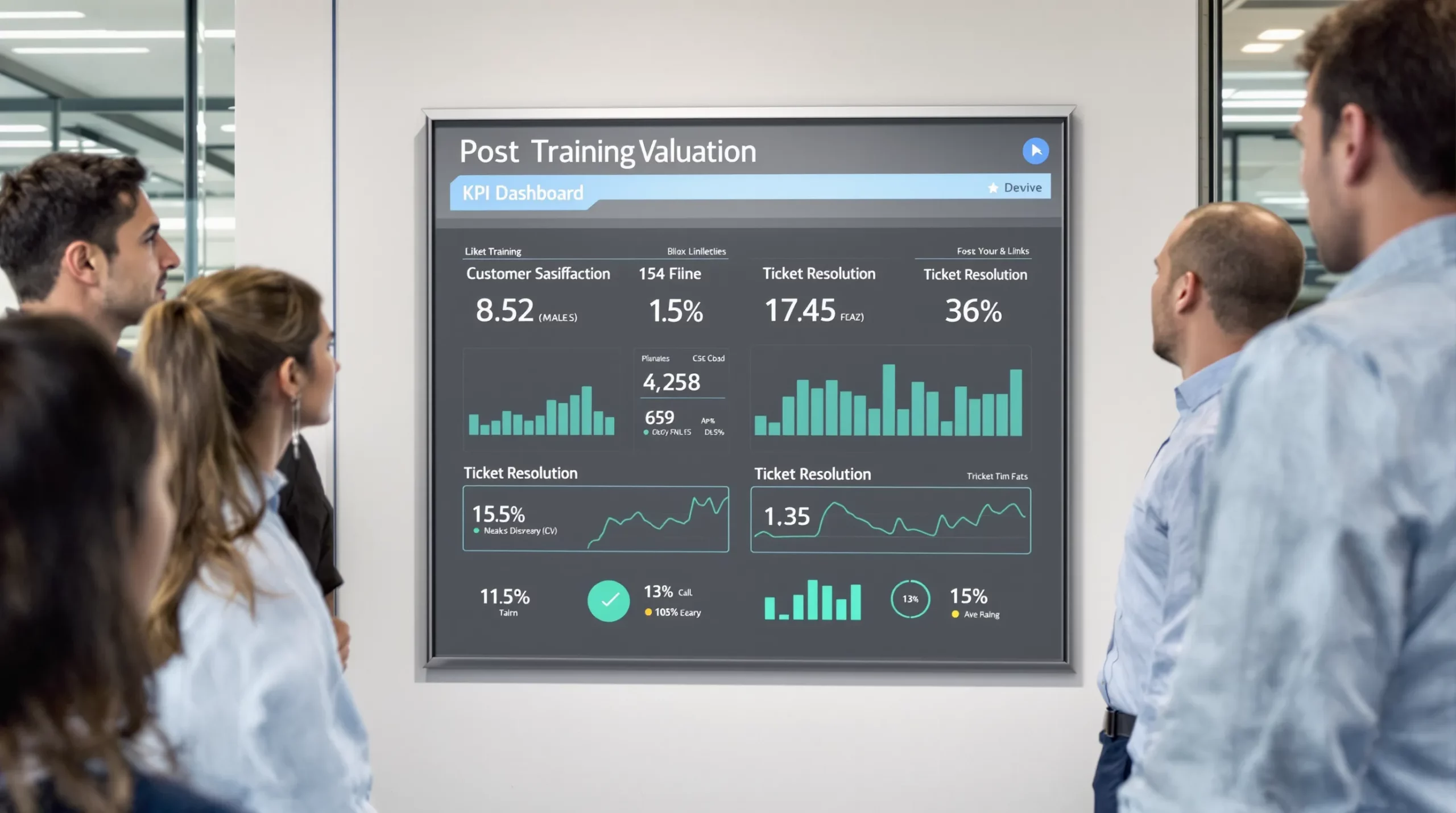How to Train Customer Support Teams on eVisa Rules in One Week

Why one-week eVisa training matters
Customer support teams sit on the front line of every travel brand. A single wrong answer about visa rules can cause a denied boarding, a furious review, and hundreds of dollars in re-accommodation costs. Yet most agents receive hours—not weeks—of formal instruction on travel documents.
The good news: with the right structure, digital resources, and a focus on electronic visas (eVisas), you can ramp up a brand-new support cohort in just five business days plus a weekend practice sprint. Below is a proven, day-by-day blueprint used by SimpleVisa partners ranging from OTAs to low-cost carriers.
Goal for the week: Reduce mis-handled visa tickets to under 2 % and hit a 95 % first-contact resolution (FCR) on eVisa queries by Day 7.
The seven-day crash course
| Day | Core objective | Key activities | Output |
|---|---|---|---|
| 1 | Build foundational knowledge | Live kickoff, micro-lessons on visa types, global eVisa map | Shared glossary + baseline quiz |
| 2 | Destination deep dive | Guided research using government portals, IATA Timatic, SimpleVisa Knowledge Base | Country cheat sheets |
| 3 | Tools & workflows | Hands-on with the SimpleVisa dashboard, API simulator, ticket macros | 5-step handling playbook |
| 4 | Scenario drills | Role-play 15 common traveller questions, objection handling | Recorded call library |
| 5 | Policy & escalation | Edge-case labs (dual nationality, overstay, transit zones) | Escalation matrix |
| 6 | Certification | 30-question assessment, KPI alignment workshop | Agent badges + scorecards |
| 7 | Go-live & coaching loop | Shadowed shifts, QBR set-up, knowledge‐base feedback | First-week performance report |
Day 1 – eVisa 101
- Kickoff huddle (30 min)
- Align on the business impact of accurate visa guidance (chargeback avoidance, ancillary revenue).
- Micro-learning playlist (1 h)
- Modules: “What is an eVisa?”, “eVisa vs ETA”, “Where to find official rules”.
- Internal link: Electronic Visa Processing 101.
- Live Q&A with a visa specialist (30 min)
- Baseline quiz (15 min) – Aim for ≥80 %.
Deliverable: a shared, searchable glossary of 40 key terms (ETA, travel authorisation, validity, reciprocity fee, etc.). Store it in your knowledge base.
Day 2 – Destination deep dive
- Data-source tour (45 min)
- IATA Timatic, US CBP, UK Home Office, plus the SimpleVisa API sandbox.
- Breakout sessions (2 h)
- Each pod studies 3–4 top destinations by booking volume.
- Agents extract: application window, allowed stay, common rejection reasons, on-arrival documents.
- Cheat-sheet sprint (1 h)
- Standard template: 1-page PDF per country, linked to official portals.
Tip: colour-code by risk level (Green: straightforward; Amber: strict photo specs; Red: diplomatic approval required).
Day 3 – Tools & workflows
- SimpleVisa dashboard walk-through (45 min)
- Locate the auto-generated “Can I travel?” message, fee breakdown, and processing-time tracker.
- API simulator lab (1 h)
- Agents paste a PNR; simulator returns visa eligibility JSON.
- Exercise: translate JSON into plain-language email.
- Ticket macro building (1 h)
- Pre-approved snippets for frequent questions: “How long is my USA eVisa valid?” can link to this guide.
- Five-step playbook
- Verify identity → Check itinerary → Consult SimpleVisa → Provide requirement summary → Offer paid application assistance.

Day 4 – Scenario drills
Role-play remains the fastest path to confidence.
- 15 rapid-fire scenarios covering: last-minute layover change, rejected passport photo, dual citizenship confusion, and more.
- Pair agents: one plays traveller, one plays agent, switch every 5 minutes.
- Record and review 3 calls per agent; coach on tone, accuracy, upsell phrasing.
Framework for answering:
- Empathise (“I know border rules can be confusing.”)
- State fact (“For Bali, you’ll need an eVisa if your stay exceeds 30 days.”)
- Guide next steps (self-service link or upsell to SimpleVisa processing).
Day 5 – Policy & escalation mastery
Edge cases cause 80 % of post-booking stress. Teach agents to spot and escalate them fast.
Common red flags:
- Traveler with one-way ticket to a country that requires proof of onward travel.
- Overstay risk based on passport stamps.
- Transit through airside visa zones (e.g., Saudi Arabia, India).
- Name mismatch between ticket and passport.
Create a two-tier escalation matrix:
- Tier 1: Senior support specialist – same-day callback.
- Tier 2: In-house visa expert / SimpleVisa concierge – average 4-hour SLA.
Day 6 – Certification & KPI alignment
- 30-question timed assessment (pass mark 90 %).
- Live call audit of one real customer interaction.
- Badging ceremony – digital certificates added to HRIS.
Why certification? Harvard Business Review notes that micro-credentials can lift agent engagement by up to 21 % (HBR, 2024).
Key support KPIs to track post-training:
- Average Handle Time (AHT) under 360 seconds.
- First Contact Resolution ≥95 %.
- eVisa Upsell Rate ≥15 % of qualified calls.
Day 7 – Go-live & continuous improvement
- Shadowed shifts: rookies listen to certified agents for two hours, then flip roles.
- Daily stand-up: share tricky tickets, update macros.
- Quarterly Business Review (QBR) date set: compare pre/post-training KPIs.
- Knowledge-base loop: agents can flag outdated rules; SimpleVisa pushes automatic alerts when governments update requirements.

Five accelerators that keep training under one week
- Micro-learning: 5–7-minute videos improve retention by 22 % vs 30-minute lectures (LinkedIn Learning, 2023).
- Real-time data: Using the SimpleVisa API ensures agents never quote outdated fees or processing times.
- Cheat sheets & macros: Reduce average handle time by 30 %.
- Buddy system: Peer coaching closes skill gaps faster than manager-only feedback.
- Gamification: Leaderboards and badges raise module completion rates to 97 %.
Measuring success after the first month
- Ticket analysis: Filter for tags “visa” or “travel documents” and review error rate.
- Customer surveys: Add a visa-specific CSAT question (“Did the agent clearly explain your eVisa requirements?”).
- Revenue tracking: Compare ancillary eVisa sales vs pre-training baseline.
If any metric lags, re-run Days 4–5 for a focused refresher.
Frequently Asked Questions (FAQ)
How technical do agents need to be to use the SimpleVisa API?
No coding skills are required. The API outputs are visualised in the dashboard; agents copy pre-formatted responses.
What if government rules change mid-training?
The SimpleVisa rules engine updates instantly. Push notifications are sent to Slack or email, and cheat sheets auto-refresh overnight.
Can this plan work for a fully remote support team?
Yes. Replace in-person role-plays with breakout rooms on Zoom and use a cloud call-recording tool for audits.
Is one week really enough for complex markets like India or Saudi Arabia?
Yes, provided Day 2 deep dives prioritise high-complexity destinations and agents have quick-reference job aids.
How often should refresher training occur?
Quarterly mini-camps or immediately after a major regulatory change.
Ready to take your support team from zero to visa hero? Book a 15-minute demo and see how SimpleVisa’s guided workflows and real-time data can shave minutes off every call while boosting ancillary revenue: